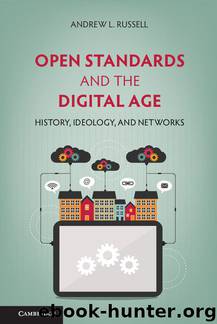Open Standards and the Digital Age: History, Ideology, and Networks (Cambridge Studies in the Emergence of Global Enterprise) by Andrew L. Russell

Author:Andrew L. Russell [Russell, Andrew L.]
Language: eng
Format: epub
Publisher: Cambridge University Press
Published: 2014-04-28T00:00:00+00:00
Conclusions
American attitudes toward advanced technologies crystallized into a broad-based ideological consensus during the 1970s. Many different groups – including hackers and university researchers, federal regulators, and engineers and scientists in the private sector – articulated new critiques of centralized control. Their consensus critique implicitly embodied three powerful convictions: the New Deal impulse to restrain corporate power; the entrepreneurial impulse to exploit new advances in electronics, materials, and information theory; and an economic impulse to seek efficiency and innovation through market competition and private ordering rather than government planning.
These impulses were specific to the telephone and computer industries, but they also shared expectations and assumptions toward technology, political economy, and control with broader swaths of American society. Historians such as Paul Edwards, Ted Friedman, and Fred Turner have analyzed, more than I have attempted to do here, the close links between counterculture ideals and skepticism toward unrestrained technological power. They point to films such as Desk Set (1957), Dr. Strangelove (1964), 2001: A Space Odyssey (1968), Blade Runner (1982), and The Terminator (1984) as well as books such as Herbert Marcuse’s One Dimensional Man (1964), E. F. Schumacher’s Small Is Beautiful (1973), and Ted Nelson’s Computer Lib/Dream Machines (1974) as indicators of an emerging critical approach to capitalist technology. These ideas took root in the freewheeling corporate cultures in Silicon Valley, which nurtured a fusion between the hacker critique of centralized control and a libertarian strain of individual freedom and empowerment.57
It would be oversimplifying matters, however, to reduce the critiques of centralized control that matured in the 1960s and 1970s to some sort of irresistible triumph of a populist or democratic control over technology. A close focus on standards has helped us see how a variety of uncoordinated attacks on AT&T and IBM facilitated redistributions of control within a dynamic network of overlapping bureaucracies.58
In the telephone industry, Strassburg had pushed the FCC to “cautiously and incrementally” experiment with competition in selected niches of telephone service. Strassburg, echoing the New Deal ethos of his early career, had no overarching plan or theory for how these experiments might play out. He simply acted on behalf of those who felt that monopoly control was harming the public interest and technological progress and sought to empower entrepreneurs and customers with direct economic interests.59 The absence of any overarching strategy guiding the decades of attacks against the Bell System was noted by journalist Steve Coll, who concluded his Deal of the Century by putting the point more forcefully. “Precious little” in the antitrust case that ended with the Bell System’s divestiture, he wrote,
was the product of a single, coherent philosophy, or a genuine, reasoned consensus, or a farsighted public policy strategy. Rather, the crucial decisions made in the telecommunications industry in the 1970s and early 1980s were driven by opportunism, short-term politics, ego, desperation, miscalculation, happenstance, greed, conflicting ideologies and personalities, and finally, when Charlie Brown [AT&T’s chairman at the time of divestiture] thought that there was nothing left, a perceived necessity.60
Download
This site does not store any files on its server. We only index and link to content provided by other sites. Please contact the content providers to delete copyright contents if any and email us, we'll remove relevant links or contents immediately.
| Automotive | Engineering |
| Transportation |
Whiskies Galore by Ian Buxton(41995)
Introduction to Aircraft Design (Cambridge Aerospace Series) by John P. Fielding(33122)
Small Unmanned Fixed-wing Aircraft Design by Andrew J. Keane Andras Sobester James P. Scanlan & András Sóbester & James P. Scanlan(32796)
Craft Beer for the Homebrewer by Michael Agnew(18237)
Turbulence by E. J. Noyes(8040)
The Complete Stick Figure Physics Tutorials by Allen Sarah(7365)
The Thirst by Nesbo Jo(6932)
Kaplan MCAT General Chemistry Review by Kaplan(6929)
Bad Blood by John Carreyrou(6611)
Modelling of Convective Heat and Mass Transfer in Rotating Flows by Igor V. Shevchuk(6433)
Learning SQL by Alan Beaulieu(6282)
Weapons of Math Destruction by Cathy O'Neil(6267)
Man-made Catastrophes and Risk Information Concealment by Dmitry Chernov & Didier Sornette(6007)
Digital Minimalism by Cal Newport;(5750)
Life 3.0: Being Human in the Age of Artificial Intelligence by Tegmark Max(5549)
iGen by Jean M. Twenge(5409)
Secrets of Antigravity Propulsion: Tesla, UFOs, and Classified Aerospace Technology by Ph.D. Paul A. Laviolette(5368)
Design of Trajectory Optimization Approach for Space Maneuver Vehicle Skip Entry Problems by Runqi Chai & Al Savvaris & Antonios Tsourdos & Senchun Chai(5066)
Pale Blue Dot by Carl Sagan(4996)
